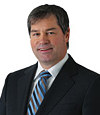On June 20, George Smith-erman's
reign as health minister of Ontario came to an abrupt
end. Five days later, Quebec Health Minister Dr Philippe
Couillard resigned his cabinet post and announced he
was leaving the legislature entirely.
Although it seems the timing was
purely coincidental, when the two men responsible for
the healthcare of nearly two-thirds of Canadians both
leave their jobs all of a sudden, you have to ask yourself:
what gives?

New Ontario Health Minister
David Caplan |
ONTARIO
SWAP
In late June, as Mr Smitherman faced growing public
criticism over his handling of the ongoing Clostridium
difficile outbreaks in the province's hospitals,
Premier Dalton McGuinty moved him to a new combined
Energy and Infrastructure "super-ministry."
David Caplan has been selected
to fill Mr Smitherman's sizeable shoes. Mr Caplan is
largely an unknown quantity. He's best known to physicians
and healthcare experts by way of his pedigree: his mother,
Elinor Caplan, served as On-tario's health minister
from 1987 to 1990.
Many healthcare analysts are already
familiar with at least one of his policies, however.
As infrastructure minister (now part of Mr Smitherman's
portfolio), he has played a central role over the past
five years in establishing hospitals funded by public-private
partnerships (P3s). Mr Caplan's appointment, says Natalie
Mehra, the director of the left-wing Ontario Health
Coalition (OHC), is "a weird message from the McGuinty
government." The OHC had hoped the Liberals would stop
short at privatizing clinical services in hospitals,
but with Mr Caplan at the helm they fear it might be
full steam ahead.
But of greater concern to the opposition
parties, apparently, are two other private issues: Mr
Caplan's excess weight and his erstwhile smoking habit
(a spokesperson says he has now butted out). The opposition
leaders publicly poked fun at Mr Caplan's waistline
after he was appointed — and they stand by their
name-calling. "He has not exhibited the personal habits
that keep you healthy," NDP health critic France G�linas
told NRM, saying her training as a physiotherapist
qualifies her to comment on the matter.
QUEBEC
SPECULATION
Premier Jean Charest's cabinet shuffle in Quebec has
been far less controversial than Ontario's, though speculation
abounds on the rationale behind Dr Couillard's resignation.
One theory says Dr Couillard — hugely popular in
Quebec — had climbed as high as he could in provincial
politics and wants a new challenge. Another theory:
he may return to neurosurgery to make more cash to feed
his large family. (In an interview with NRM last
December, Dr Couillard advised doctors to consider the
pay cut before going into politics. "The advice I would
give is that they should look at it very carefully with
their accountant — in my case I didn't do this.")

New Quebec Health Minister
Yves Bolduc |
Replacing Dr Couillard as health
minister is rural GP and hospital administrator Yves
Bolduc, who ran as a Liberal candidate and lost in last
year's election. Both the GPs' and specialists' unions
agree that Dr Couillard's reforms — towards better
access to care and fewer restrictions on doctors' private-healthcare
initiatives — should be part of Dr Bolduc's plans.
"I'm expecting continuity," Quebec Federation of Medical
Specialists president Dr Ga�tan Barrette told NRM.
"I hope we won't see drastic changes."
The departures of two fairly popular
health ministers can only mean that the Canadian healthcare
system remains an intractable problem, said columnist
Chantal H�bert on the CBC News At Issue panel in late
June. Quebec's and Ontario's unresolved difficulties
— rising costs, wait times, the family physician
shortage and infectious disease control, among others
— will now fall to Mr Caplan and Dr Bolduc to grapple
with, as Mr Smitherman's explosive personality bursts
onto the nuclear-power, gambling and liquor scene in
Ontario and Dr Couillard finally takes a vacation after
years of tumult and turmoil in the National Assembly.
He told reporters, "I'm going to go fishing a lot this
summer."
|